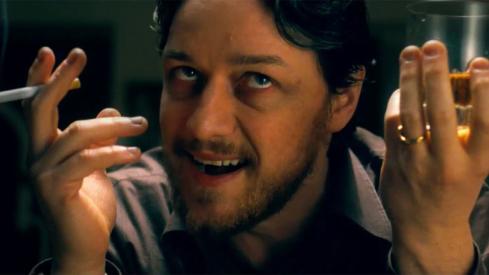Filth: Review
There was an atmosphere of tense uneasiness in the air as I sat down in the cinema with my companion. Perhaps it was because of the material a film called ‘Filth’ could potentially serve up, perhaps it was because the certificate flashed up, reading: ‘contains strong sexual content, very strong language, strong drug use and violence.’ My companion turned around slightly, then tapped my shoulder, I followed her gaze and only then saw couple behind us glued to each other’s faces, their bag of popcorn slipping slowly off the seat. I guess they decided to make their own version of the film, although if they were providing the ‘sexual content’ throughout the entirety of the movie, I had a feeling the rest of the audience would supply the ‘strong language and violence.’
Filth is a film based on the Scottish Irvine Welsh book of the same name, directed by John S. Baird and starring James McVoy, Jamie Bell and Eddie Marsan. McVoy plays Detective Bruce Robertson, the corrupt cop (putting it very lightly) lying and deceiving his way towards his much desired promotion, utterly destroying everything in his path through any means. The moment you see Bruce Robertson stride on screen and call Scotland “such a uniquely successful race,” with about as much sarcasm as a human can master, you love him. You shouldn’t, because he’s a sick, twisted, psychotic, sex addicted a**hole who fancies himself as God. But his mischievous grin and tendency to break the 4th wall, letting us in on whatever devious scheme he’s pulling wins us over. Director John Baird directs this film the only way it could be directed, filthily. He doesn’t shy away from the controversial content of the original book and connects us to Bruce through uses of abstract dream-like sequences of his therapy and uncompromising images of abuse to just about every substance there is, including people. He really knows what kind of story he’s at the helm of and delivers it with masterful edginess, hilarity and sentiment. The editing in the film is almost as fast paced and spontaneous as the witty dialogue and is beautiful handled, props to Mark Eckersley in that department. Filth is a film of two very different halves, the first being the controversial, gritty and absolutely hilarious story of Bruce drifting through his life of pure guilty pleasure-which is exactly what you feel while watching it. You laugh at lines and situations that would otherwise repulse you if not for the underlying sense of security you have that it’s still a comedy- of the darkest, jettiest black. The second half all but takes away the comedy, leaving just the jet black. We see Bruce descend more and more into insanity, realising only then how warped of an individual he really is, we almost feel sympathy for him as we recognize the Bruce we thought we knew-the very same way Bruce saw himself, is a man suffering a complete mental breakdown.
James McVoy’s performance is truly phenomenal. In seconds he turns from a fragile and self pitied wreck into a terrifying force of hatred and contempt for everything around him. It is truly an injustice that he wasn’t nominated for this role, as very rarely do we see an actor taking the risks and dangers of this kind of content as he does. The film rested on his shoulders and McVoy didn’t stumble once. Honourable mentions should go to Eddie Marsan as his domestic enforcement partner and Jamie Bell as the police department rookie, both pull off their characters impressively. Someone who I thought was wasted was Imogen Poots, an actress who has more than proved herself in other roles. I felt like her character could have been played by anyone and during her scenes found myself counting the seconds to Bruce’s next skulduggery. By the end of the film, the atmosphere of the cinema had become something resembling melancholy, disbelief of how empty and hollow the last few images of the film left us compared to the energetic start. The couple behind us left their seats without a word and walked solemnly out of the doors, having been hit by a film which unapologetically pushed the boundaries of its conventions and became, in my mind, a cold-blooded classic.

